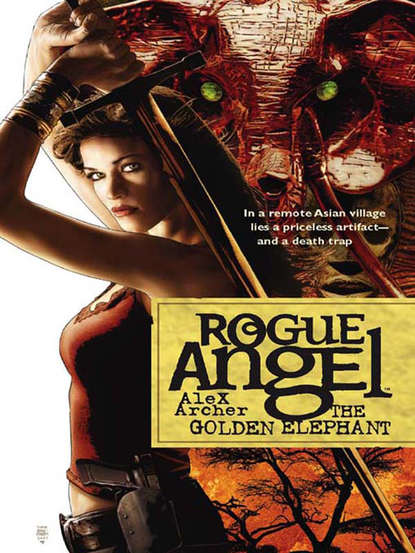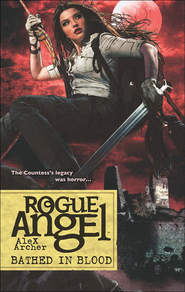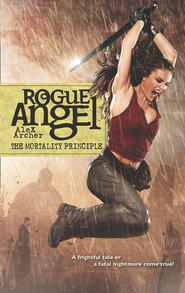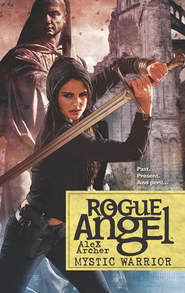По всем вопросам обращайтесь на: info@litportal.ru
(©) 2003-2025.
✖
The Golden Elephant
Автор
Год написания книги
2019
Настройки чтения
Размер шрифта
Высота строк
Поля
“Well, sometimes reason deserts someone like you,” Roux said.
For a moment Annja sat and marinated in her misery. But prolonged self-pity annoyed her. So she sought to externalize her funk. “It’s just losing such an artifact—the only trace of that tomb—to a plunderer like Easy Ngwenya. She just violates everything I stand for as an archaeologist. I’ve always considered her nothing better than a looter.”
She frowned ferociously and jutted her chin. “Now it’s personal.”
Roux set down his cup and leaned forward. “Enough of this. Now, listen. Your secret career is an expensive indulgence—”
“Which I never volunteered for in the first place!” Annja said.
“Details. The fact is, you have been burning money. As I have alluded to, certain creditors grow—insistent.”
Annja frowned thoughtfully. She could see his point. There was no denying her recent adventures had been costly. The rise of digital records and biometric identification hadn’t made official documentation more secure—the opposite, if anything. But full-spectrum false identification was expensive. And Annja relied greatly on fake ID to avoid having her secret career exposed by official nosiness.
She leaned back and crossed her legs. “Has Bank of America been making nasty phone calls?”
“Think less modern in methods of collection, and more Medici.”
“You haven’t been borrowing from Garin again?” Annya asked.
His lips compressed behind his neat beard. “It’s…possible.”
Garin Braden was a fabulously wealthy playboy. He was also Roux’s former protégé and he feared the miraculous reforging of the sword threatened his eternal life.
“I bet you’ve just had a bad streak at the gaming tables,” Annja said accusatorily. “Didn’t you get busted out of that poker tournament in Australia last month?”
“All that aside, we must improve what you Americans charmingly call cash flow.”
She sighed. “Tell me,” she said.
“Somewhere in the mountainous jungles of Southeast Asia there supposedly lies a vast and ancient temple complex. Within it hides a priceless artifact—a golden elephant idol with emerald eyes. I have been approached by a wealthy collector who wants it enough to pay most handsomely.”
“Who?”
“One who treasures anonymity,” Roux said.
“That’s a promising start,” Annja said, not bothering to hide the sarcasm in her voice. “So I take it all this mystery likewise precludes your at least running a credit check?”
“Sadly,” Roux said, “yes.”
He spread his hands in a dismissive gesture. “However, our client—”
“Let’s hold off on this our business until I’m actually signed on, shall we?” Annja said.
“ Our client has offered a handsome preliminary payment, as well as an advance against expenses.”
“The preliminary, at least, needs to be no-strings-attached,” Annja said.
Roux raised his eyebrow again.
“What?” Annja said.
“That would require substantial faith on the client’s part,” Roux said.
“So? Either he-she-it has faith in me, or doesn’t. If they’re not willing to believe in my integrity, then to heck with it. And why come to me, anyway, if that’s the case? If I’m not honest, there’s ten dozen ways I could chisel, from embezzling the expense account to selling to the highest bidder whatever it is this mystery guest wants me to get. There isn’t any guarantee I could give that could protect against that. If I’m a crook, what’s my guarantee worth?”
Roux looked as if he were bursting to respond. She glared him into silence.
“While we’re on the subject,” she said, “there’s not going to be any accounting for expenses incurred. For reasons I really hope you won’t make me explain out loud.”
He sipped his coffee and pulled a gloomy face. “You don’t ask for much, my dear child,” he said, “beyond the sun, the moon and perhaps the stars.”
“Just a star or two,” she said. “Anyway, you’re the one whining the exchequer might be forced to go to bed tonight without any gruel if little Annja doesn’t hie herself off to Southeast Asia and do something certainly arduous, probably dangerous and more than likely illegal. You should be happy to ask for the best no-money-back terms available.”
“I don’t want to scare the client off,” Roux said.
“This strikes me as skirting pretty close to pot-hunting,” Annja said. “The jade-seal affair already came too close.”
“But you’ve done similar things in the past,” Roux said. “And after all, who better to ensure the Golden Elephant is recovered in a…sensitive way rather than ripped from the earth by a tomb-robber?”
He turned his splendid head of silver hair to profile so he could regard her sidelong with slitted eyes. “Or would you prefer to leave the field open to, say, the likes of Her Highness, E. C. Ngwenya?”
“Quit with the psychological manipulation,” she said. But even to her ears her voice sounded less than perfectly confident.
3
London, England
“Tea, Ms. Creed?” asked the bluff and jovial old Englishman with the big pink face, a brush of white hair and a red vest straining slightly over his paunch. With an exquisitely manicured hand he held up a white porcelain teapot with flowers painted on it.
Annja smiled. “Thank you, Sir Sidney.” She started to rise from the floral-upholstered chair. She would term the small round table, the flowered sofa and chairs, the eclectic bric-a-brac in Sir Sidney Hazelton’s parlor as fussy Victorian.
He gestured her to stay seated. He poured the tea with a firm if liver-spotted hand protruding from a stiff white cuff with brisk precision, then brought her the cup with a great air of solicitude.
“Thank you,” she said, accepting.
Sir Sidney reseated himself in his overstuffed chair. He’d offered one like it to Annja, insisting that it was more comfortable than the one she chose. She declined, fearing if she sank into it the thing would devour her. She had to admit that despite his bulk he moved with alacrity, including in and out of the treacherously yielding chair.
“Really, isn’t this notion of lost cities or temples more frightfully romantic than realistic?” he asked. “I mean, what with all these satellites and surveillance aircraft and such today.”
Annja pursed her lips. She had some experience with what could be seen from satellites—and also of things that could not. She chose her words carefully.
“It’s a matter of who pays attention to what image,” she said. She told herself she didn’t need any extra complications. “Not everyone who runs across overhead imaging of, say, a lost temple has the knowledge to recognize what they’re looking at. And many of the most skilled image analysts don’t care. They’re looking for military information, or maybe stray nuclear materials. Not ancient ruins. Although some pretty astonishing ruins have been discovered by overhead photography, just in the last couple of decades.”
“So I gather,” Sir Sidney said. “Well, I must say it does a body good to believe there’s still some mystery left in this old world of ours. Quite bracing, actually.”
She raised a brow. “Aren’t you the expert in lost treasures and fabled ruins?”
He smiled. “My dear, the operative word there is fabled. I am, as you know, a cultural anthropologist. Specifically I am a mythologist. I study the phenomena of myths. Particularly pertaining to myths about lost treasures.”











